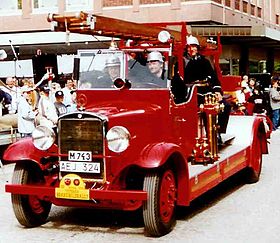
Summary
The Volvo LV66-70 was a truck produced by Swedish automaker Volvo between 1931 and 1936.
| Volvo LV66-series | |
|---|---|
 | |
| Overview | |
| Manufacturer | Volvo |
| Production | 1931 - 1936, approx. 2,370 produced[1] |
| Body and chassis | |
| Class | Medium/heavy duty truck |
| Powertrain | |
| Engine | Penta ohv inline 6 |
| Transmission | 4 speed non-syncro manual |
| Dimensions | |
| Wheelbase | 3.4 m (133.9 in) - 4.6 m (181.1 in)[1] |
| Curb weight | 6,000 kg (13,227.7 lb) - 9,500 kg (20,943.9 lb) (gross weight)[1] |
| Chronology | |
| Successor | Volvo Longnose |
History edit
Volvo introduced its first heavy truck in 1931. Unlike its smaller sibling, who used some elements from Volvo's passenger cars, the LV66-series components were built exclusively for truck use.[2] These included a new overhead valve engine, a heavy duty four-speed gear box, steel rims and four-wheel hydraulic brakes.
The truck was built in two weight classes: the smaller LV68 and LV69 with a payload of 3.25 tonnes and the heavier LV66 and LV67 with a payload of 3.5 tonnes. From 1933 the LV66 and LV67 could be delivered with a trailing axle which increased the payload to 5.25 tonnes. The long wheelbase LV70 was primarily equipped with bus bodies.[2]
From 1933 the LV66-series were sold with a Hesselman engine as an alternative.
Engines edit
| Model | Year | Engine[1] | Displacement | Power | Type |
|---|---|---|---|---|---|
| LV66-70 | 1931-36 | Penta DC: I6 ohv | 4,097 cc (250.0 cu in) | 75 bhp (56 kW) | Petrol engine |
| LV66-70 | 1933-36 | Penta HA: I6 ohv | 4,097 cc (250.0 cu in) | 75 bhp (56 kW) | Hesselman engine |
References edit
External links edit
- Volvo Trucks Global - history
- Swedish brass cars - picture gallery
- Volvo Trucks Databank (in Dutch)


